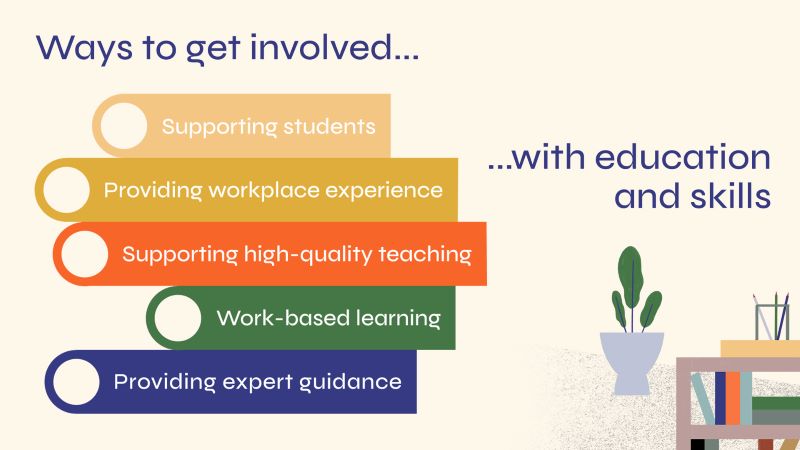Engaging with Education
Engaging with the Education Landscape for Employers
A skilled workforce is at the heart of every business. As a business leader you get enquiries to work with local schools, colleges and universities – and you’ll probably have some questions given the education and skills landscape can be complex to understand.
There are many different ways to get involved – but which are the best fit for your business, and how will they help connect you to your future workforce, or boost productivity by upskilling your current team?
Here are some of the ways that you can connect to your future workforce, or boost productivity by upskilling your current team.
Click on the drop-down arrows to find out more.

WORK-BASED LEARNING
Apprenticeships
Offering apprenticeships is an effective way for any organisation to grow talent and develop a motivated, skilled and qualified workforce. Those
starting an apprenticeship are aged 16 or older. They will also be studying at a local college or training company for off-the-job training and are
usually released for one day a week to complete this. There are minimum wage requirements for apprentices. On completing their apprenticeship an individual is competent to undertake the occupation they have trained for. They could also move to a more senior apprenticeship. Apprenticeships take a minimum of twelve months to complete. The overall time will vary depending on the level of apprenticeship and an individual’s
prior learning and experience:
– Intermediate apprenticeships (up to three years)
– Advanced apprenticeships (up to four years)
– Higher (up to four years) and degree apprenticeships (up to six years)
Supported Internships
Supported Internships are a structured, work-based programme for 16–24 year olds with Special Educational Needs and Disabilities (SEND). Interns
spend the majority of their time at the workplace, undertaking a placement that lasts between six months and a year. Alongside their time with the
employer, each intern also completes a study programme at their school or college, which includes studying English and maths. A dedicated member of staff at the school or college works with employers to support the internship process
Employment Support Programmes
The Government has introduced several schemes to provide help and training to young people and adults looking for work, who may not have a
set of formal qualifications, may have been through alternative education routes or who may be facing other barriers to the workplace. They all
benefit from employer involvement, by offering either work experience or providing advice and guidance.
Upskilling Your Workforce
Specific programmes are designed to strengthen higher technical education, including through
Higher Technical Qualifications. Institutions working in this area include Institutes of Technology (IoTs), which are collaborations between existing
further education colleges, universities, and leading employers. Some of the range of government programmes offer financial incentives. There are also free resources, such as the Skills Builder Universal Framework, that you could build into your own recruitment and training to help
develop your staff.

SUPPORTING STUDENTS
SUPPORTING HIGH QUALITY TEACHING
Careers Talk
Schools, colleges and universities value employers delivering a presentation about career paths in a particular industry or organisation and sharing personal career journeys with students.
Careers Events
Getting involved in careers events enables you to increase young people’s understanding of your organisation or industry and inspire their future
career choices. It can also be an opportunity to inform and influence Parents, carers and guardians who can play a key role in young people’s
career decisions. You may be asked to act as an ambassador, contributing
to school or college choices events, careers and/or recruitment fairs, speed-networking events, or present a careers talk.
Preparing for Job Applications
Employers can provide invaluable advice and support on writing CVs, completing job applications and interviews. Activities you can take part in include offering CV feedback or workshops, practice interviews and Q&A sessions.
Employer Mentoring
Mentors provide a positive role model for young people. You work one-to-one with a student, typically aged 14 or above, to help build their confidence, develop their resilience, and support their aspirations. Some mentors also help students to develop particular subject knowledge and skills. In some cases, the mentor-student work has a specific goal, such as preparing for an apprenticeship or job applications, or for higher level study at college or university
Supporting Extra Curricular Activities
Employers can help students to develop essential skills – such as teamwork, communication and problem solving – by getting involved in a
range of extra-curricular activities. These activities include school clubs, and skills or entrepreneurial competitions at local, regional or national events. Your support could be in the form of setting challenges, running workshops, mentoring teams, and/or judging competitions
Contributing Facilities or Specialist Equipment
Employers can help by donating or loaning equipment including machinery, tools, computer hardware and software or workshop items. Alternatively, you may wish to consider providing
occasional access to your premises where possible. Some colleges also host manufacturers’ equipment, enabling local companies to
view demonstrations on their sites
Professional Development for Teachers
Employers can give teachers first-hand experience of their industry through professional development opportunities such as site visits, short placements for teachers, or longer-term part-time working arrangements between the institutions. These opportunities help to maintain teachers’ knowledge of the latest technical and professional developments in your industry, including present and future career opportunities, and the knowledge, skills and behaviours required for different roles. Teachers use these insights to inspire their students and keep the teaching curriculum up to date.
Providing Specialist Input for Classes
Employers can share specialist knowledge with students in a variety of ways, such as advising on new technologies, processes and services
within a specific industry. You could act as an ‘Industry Associate’ – getting involved in a range of activities with students including presenting masterclasses, helping to deliver workshops or lectures
Helping Design a Course
Employer input can add real relevance to educational programmes to bring the curriculum to life and equip young people for the transition
from school or college into the workplace. You can support teachers in a range of ways, from giving feedback on the curriculum content, to co-designing courses. For particular topics you may help with designing a specialist lesson or workshop or being involved in case studies and projects
Setting and Supporting Student Projects
With employer projects students address a ‘real-life’ challenge experienced by a local employer – their client. You will be involved throughout the project, working with teaching staff in designing and setting the task, reviewing students’ progress, receiving the final product or report and feeding back to students. In some cases, a project could
be a formal requirement of a student’s qualification, and at higher levels, students can work on solutions for your real business challenges
| Helpful Resources |
| Teacher CPD |
| Be Ready: CPD |
| Skills Builder Universal Framework |
PROVIDING EXPERT GUIDANCE
Contributing to National, Regional or Local Skills Planning
Employers can provide labour market intelligence to inform planning for education and skills provision at local, regional and national levels.
At the national level, panels of employer groups develop standards for apprenticeships, which also inform the development of some technical
qualifications. At a local level, organisations such as Combined Authorities and Councils convene skills boards to inform their planning, and employer representative bodies around the country are developing Local Skills Improvement Plans to resolve skills shortages, sharing their knowledge of labour market needs in order to shape the education and training provision on offer.
Acting as Governor
As a local school or college governor you will be a member of the governing board, with direct input into the institution’s strategic direction. For example, you could be called upon to uphold the
institution’s vision, ensuring strong financial management and appropriate policies are maintained. You may also be able to take the lead on particular interest areas such as careers provision, curriculum development and/or links to industry.
Enterprise Advisor
Enterprise advisers partner with a local school or college to help them improve their connections with industry and develop and implement
their careers strategy. Enterprise advisers may also be asked to get involved in delivering Careers events
PROVIDING EXPERIENCES OF THE WORKPLACE
Workplace Visits
Hosting a short workplace visit for an individual or group of students gives them an overview of your organisation and industry, and an insight into the
working environment. It is also a great opportunity to inspire their future work experience and career choices. The visit could be a few hours or a full day, and include presentations, site tours, hands-on experience and/or Q&A sessions
Job Shadowing
This gives young people the opportunity to spend time observing (shadowing) one or more employees for a short period. This offers the student a snapshot view of a role, working life, and your organisation. Job shadowing usually takes place over one to three days. It can form
the early part of a short work experience
Short Experiences of the Workplace
Students typically spend several days within an
organisation undertaking a number of activities under supervision. The experience will help develop students’ general understanding of
the workplace, build their confidence, possibly influence their choice of career path, and support their preparation for the transition from school or college into employment. Alongside this, you have the opportunity to showcase your organisation and industry
T-Level Industry Placements For 16-19 Year Olds
During an industry placement a student spends an extended period of time with an employer as part of their formal education programme. They gain essential workplace knowledge and skills that employers seek, thus helping to prepare them for employment or further training. Placements may be delivered in one block or spread over the duration of the student’s course. Placements also give you an additional resource for your team, and an opportunity to introduce a student to your organisation and industry. You may use the placement to assess a student’s capability with a view to future recruitment, for example, for an apprenticeship or other job role
Placements and Internships for Higher Education Students
Many higher education (HE) courses include a period of up to a year spent in industry, enabling students to build their knowledge and skills in the
workplace setting. Students have the opportunity to develop relevant industry and essential skills. Longer placements also give you additional
resource for your team, and you can use the opportunity to assess a student’s capability, often recruiting direct from the placement programmes.
Volunteer Opportunities
Volunteering opportunities can provide students with experience of the workplace and career inspiration. The opportunity will often be arranged
between the student and the employer, and there will not be formal requirements – such as length or goals – specified by the student’s school, college or university. Volunteers would not be expected to be responsible for specific roles or projects
 Afrikaans
Afrikaans Arabic
Arabic Chinese (Simplified)
Chinese (Simplified) Dutch
Dutch English
English French
French German
German Greek
Greek Hebrew
Hebrew Italian
Italian Japanese
Japanese Korean
Korean Kurdish (Kurmanji)
Kurdish (Kurmanji) Latvian
Latvian Lithuanian
Lithuanian Persian
Persian Polish
Polish Portuguese
Portuguese Romanian
Romanian Russian
Russian Slovenian
Slovenian Spanish
Spanish Sundanese
Sundanese Ukrainian
Ukrainian Urdu
Urdu Welsh
Welsh